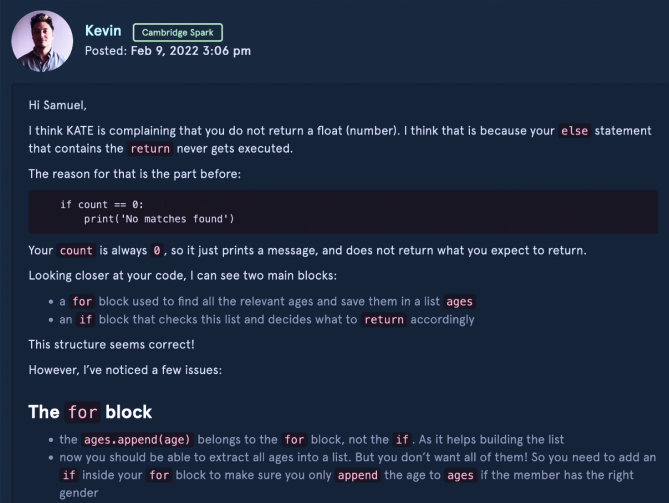Data Citizen Apprenticeship (Level 3)
Master the essential mindset, tools and skills to thrive in a data-driven organisation

One data apprentice can create real business impact
98% reduction in reporting time
£39,000 annually saved on reporting costs
208 hours of FTE time saved through automations
77% increase on KPI through access to real-time reporting
Build the data fluency of your workforce
Eligibility
The program is designed for professionals from diverse backgrounds, including those in non-technical roles, who want to enhance their data literacy and effectively use data in their work. Employees must meet the following criteria:
Suitability of role
- Regularly using spreadsheets in their work
- Often using spreadsheets or other sources to provide insight to colleagues
- Manually creating reports with tools like Excel
- Looking to use data to increase their productivity
Eligibility for funding
- No prior equivalent data training or related experience.
- Employed in England and resident in the UK or EEA for the last 3 years.
- Employees working at least 30 hours a week (part-time employees can be considered for a minimum cohort size)
- Can commit to the minimum 6 hours a week off the job learning requirement for the duration of the programme (13 months of training)
What makes the programme special
We deliver all of our programmes online, helping our clients offer flexible and inclusive programmes open to all of their staff. EDUKATE.AI, our online learning platform, gives learners a sandbox environment to practice their skills, providing them with immediate feedback on industry-simulated assignments. We believe that the gold standard for online delivery is to offer a mix of experiential learning, coaching, technical mentorship and peer support.
Real-World Practice for Accelerated Impact
EDUKATE.AI provides a sandbox environment where learners can practice new skills on real assignments. This accelerates the impact that learners can make in their workplace, allowing them to immediately apply what they've learned.
EDUKATE.AI
Our online learning platform offers apprentices a seamless learning experience with in-browser access to their slides, lecture recordings, quizzes and practical assignments. Immediate feedback enables apprentices to gauge their progress effectively.
Unique contextualisation
Collaborating with industry-leading partners, our program offers contextualised options catered to journalists, NHS professionals, and HR professionals, empowering them with the essential data literacy skills needed for success in their respective roles.
Personalized Learner Support
We provide each learner with a dedicated Data Mentor and Learner Success Coach to support them on their technical and personal development. This personalized support structure helps learners to succeed and overcome obstacles they encounter.
Flexible Fully Online Learning
Our program is fully online, providing maximum flexibility for learners and employers alike. This means that learners can access their content from anywhere, with no set up or installation of EDUKATE.AI required.
Expert Curriculum
Our comprehensive curriculum develops the skills to succeed in a data-driven organisation. As well as teaching concepts such as the value of data and storytelling with data, learners will become proficient with dashboarding tools such as Power BI.
Community
Joining our program means becoming part of a thriving community of thousands of data professionals. Learners have the opportunity to tap into this rich network of peers and alumni and benefit from the expertise and experience of others in the field.
A real-world learning experience
EDUKATE.AI is our learning experience platform which delivers a seamless experience in one place and accelerates learning and impact through real practice on real projects with immediate, personalised feedback on code.

The Curriculum
Our data literacy curriculum is developed by our leading faculty, composed of data scientists in leading industry positions and academics from some of the top universities in the world. Our curriculum is continuously updated and reiterated to incorporate the latest skills.For employees working in the NHS or in roles in journalism, we offer contextualised versions of the curriculum designed to maximise success at work.
Core Modules
- The Value of Data
-
Understand the value of data and the way digital technologies are fundamentally changing the global economy, market structures and creating new opportunities.
- Future Learning and Careers in Data
-
Develop the active learning skills needed to keep up with the fast-changing, data-driven, digitally-transformed economy by cultivating an adaptable and resilient learning mindset.
- Data Concepts
-
Get acquainted with essential data concepts, tools, processes and vocabulary.
- Basic Numbers for Data Analysis
-
Develop intuition for underlying statistical concepts and what the numbers mean in practice.
- Data Sourcing and Integration
-
Learn how to blend, manipulate and link data sets from multiple sources in a range of formats appropriate to the task at hand.
- Data Preparation, Quality and Validation
-
Validate data to ensure consistency and quality compliantly and develop techniques to check for errors and help ensure the highest levels of data quality.
- Excel for Data Analysis
-
Use Excel to prepare, format and integrate different types of data accurately and consistently following industry best practice.
- Charts and Visualisation
-
Create insightful, action-inducing, data-driven graphs and charts in Excel.
- Dashboarding Tools
-
Build on previous learning and increase skills in time series analysis and clustering of data.
- Storytelling and Presenting with Data
-
Build narrative around data to hone in on and share key insights, create impactful visualisations.
- Reporting and Actioning Insights
-
Prepare reports to help action data-driven insights and use interpretation and judgement to solve problems by working collaboratively, thinking critically and reasoning analytically.
- Data Storage, Compliance and Security
-
Collect data securely using Excel from trusted sources ensuring compliance with relevant regulatory and legal standards and industry and organisational best practice.
- Introduction to Coding with Python
-
Get familiar with key coding concepts as well as fundamental foundations to help decide if Python is something to explore further.
Enquire now
Fill out the following form and we’ll contact you within one business day to discuss and answer any questions you have about the programme. We look forward to speaking with you.
FAQs
What delivery options do you offer?
We tailor our delivery to your workforce needs. This ranges from independent, immersive elearning supported by EDUKATE.AI through to tailored bootcamps, to our structured apprenticeship programmes. Learners based in England and enrolling in the Level 3 Data Citizen Apprenticeship may be eligible for UK Levy funding.
Are you able to tailor the programme to the organisation and sector?
What is an apprenticeship?
An apprenticeship is a long-term training commitment which seeks to support people entering the workforce and upskill existing UK-based employees within an organisation, enabling employers to foster a workforce consisting of highly skilled and highly engaged talent.
The Cambridge Spark Data Citizen Apprenticeship runs for 13 months plus a 3-month end-point assessment and includes a minimum of 6 hours per week off-the-job training, enabling a blended approach between theory and practical learning.
What Is the Apprenticeship Levy?
The UK government introduced the Apprenticeship Levy scheme in April 2017 as a way to drive investment in strengthening the country’s skills base.
All organisations with annual staff costs of over £3m have to pay 0.5% of their salary bill into a ring-fenced apprenticeship levy pot. The money is collected monthly via PAYE and can only be used for training on approved apprenticeship schemes (such as the Level 3 Data Citizen Apprenticeship that we offer). Organisations must forfeit any levy funding left unspent for 24 months or more.
What if my organisation doesn't pay into the UK Apprenticeship Levy?
What does "off-the-job training" mean?
Off-the-job training is defined as learning undertaken outside of the day-to-day work duties and during the apprentice’s normal working hours.
Our off-the-job training is delivered on a flexible basis and can be carried out at the apprentice’s place of work or home.
The 6 hours per week, minimum, off-the-job training provides learners with the time to focus and develop the required skills, knowledge and behaviours to complete the programme.
How much do managers need to be involved?
Managers will need to ensure apprentices achieve their planned off-the-job training hours and work on their project portfolio.
We also encourage managers to have regular one-to-one meetings with apprentices to catch up on how they are progressing and to join the apprentice and their coach for 30 minutes every 3-4 months for a general catch up about the programme.
Who's benefitted from our data apprenticeships
Why we’re the education technology training partner of choice.

Case study
Building AI capability in media and broadcasting with AI apprenticeships

Case study
Data Analyst Apprentice identifies £30k of savings for GSK

Case study
Deep Learning and Natural Language Processing (NLP) Training for Deloitte

Case study
Developing Python Programming Skills Within the NHS